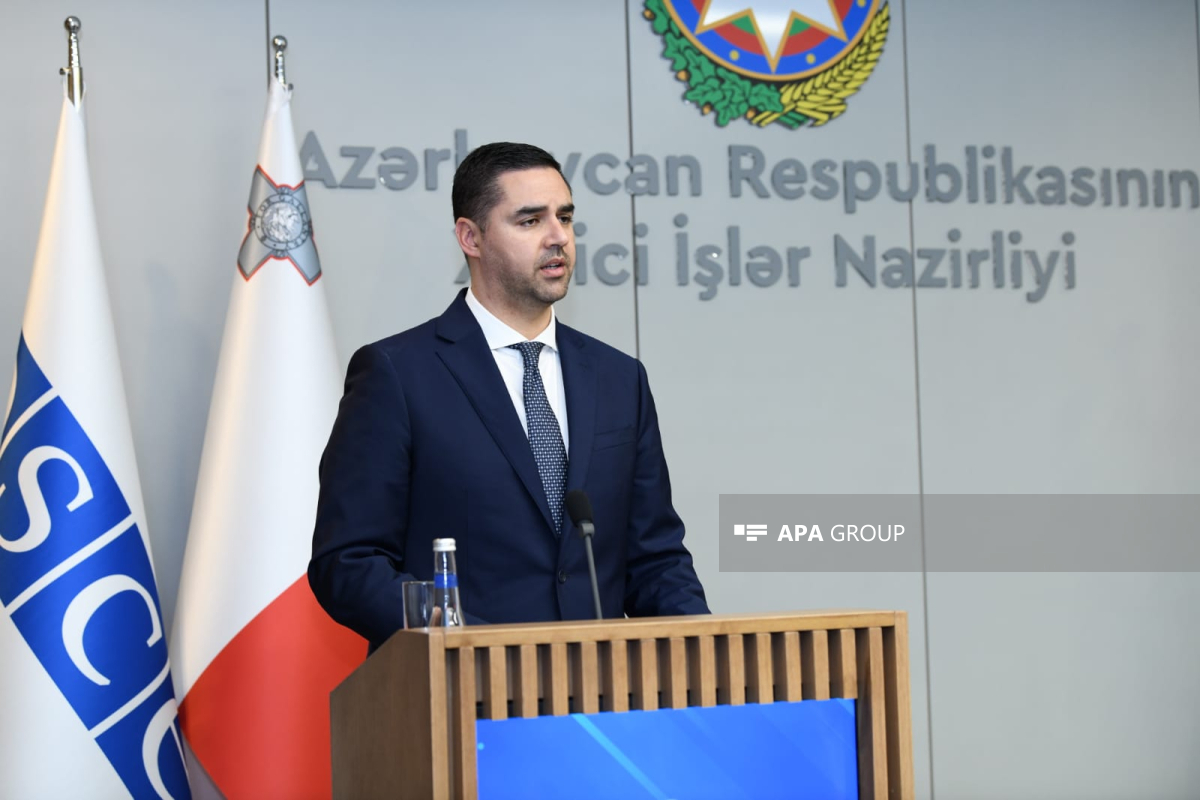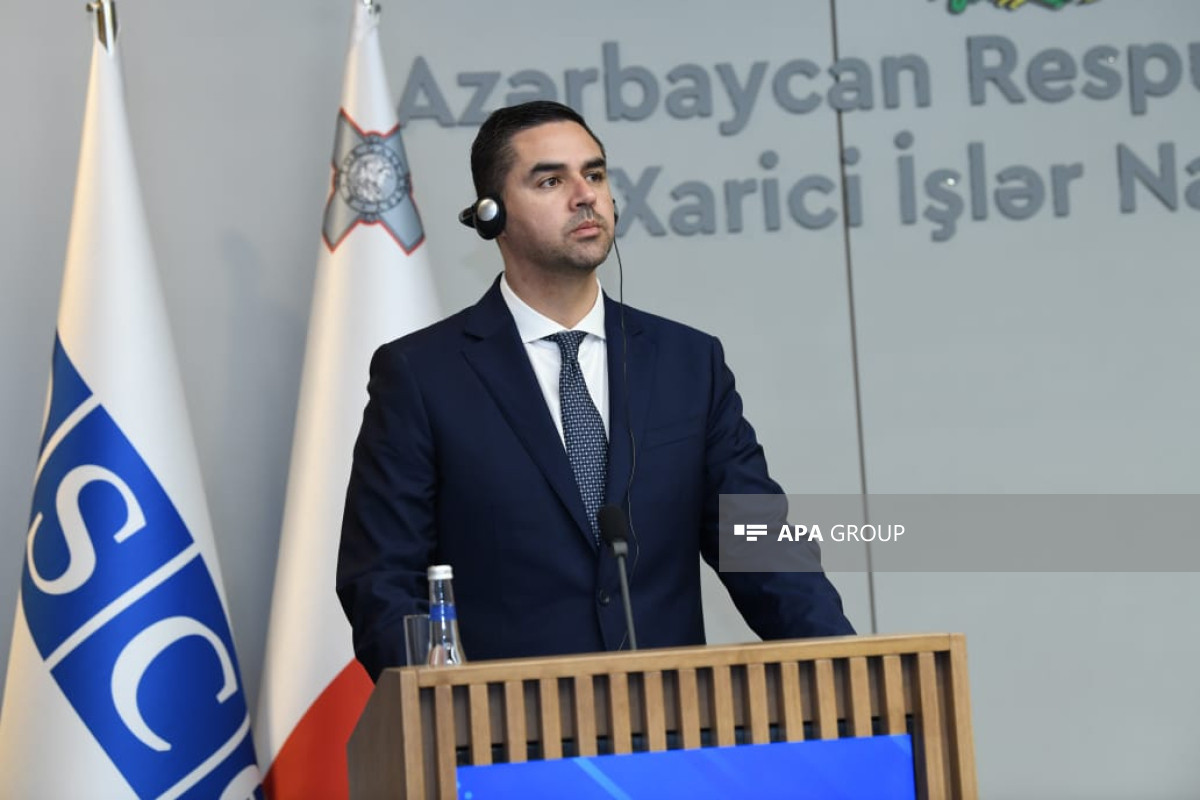OSCE Chair-in-Office, Minister for Foreign and European Affairs and Trade of the Republic of Malta Ian Borg's interview with APA
- As you visited the region, held meetings in Yerevan and Baku. Mr. Minister, how would you assess the overall situation in the region?
- The political and security situation on the ground is very dynamic, from appearing stable to - at times - fragile. This is why we will continue to monitor it closely. Having said that, and despite the significant challenges that lie ahead, I am cautiously optimistic and aware of the opportunities that sustainable peace would bring. There is progress on border delimitation, which constitutes steps towards a possible peace agreement between Armenia and Azerbaijan. However, a lasting, long-term settlement continues to demand significant compromise and considerable political will from both sides, and an understanding in society that bold steps and pragmatism are necessary. We need a constant dialogue on an equal footing and pragmatism to achieve sustainable peace.
It is also clear that a durable and sustainable settlement would be further strengthened by active, complementary support and engagement of the international community. In this regard, with the OSCE’s comprehensive set of tools and decades of experience, we stand ready to assist and complement the efforts of Azerbaijanis and Armenians, in the interest of peace, security and stability.

- In the press conference, you noted that OSCE is aware that the parties prefer bilateral level talks. Indeed, it is a rare situation, I think, OSCE expresses its support to bilateral negotiations which are always in the role of mediator...
- My focus is simple: I want to actively support Armenia and Azerbaijan in their efforts to normalise their bilateral relations through comprehensive and inclusive dialogue, which is the path they have taken and should be accompanied by international partners where possible.
The increased pattern in the peace negotiations is noteworthy and its continuation essential, and the OSCE is fully committed to backing both bilateral and multilateral efforts, where applicable and required, directed towards this end. Pursuing diplomacy and employing peaceful means remain the only viable path to securing a lasting resolution that adheres to the fundamental principles and commitments of the OSCE.
As the current Chair, Malta, along with the broader OSCE framework, stands ready to offer our good offices and communication channels. Our platform is uniquely positioned, driven by a clear interest in cultivating peace and fostering regional co-operation in the South Caucasus.
- Mr. Borg, you characterized the recent development in the delimitation process between Armenia and Azerbaijan as a "valuable step". In fact, the international community also already welcomed the process, but on the other hand, we see certain groups in Armenia trying to undermine the process... So, how can the international community/organizations encourage the process?
- As a representative of an important organisation, the OSCE, I have repeatedly welcomed the progress made in the delimitation of the border. And I have made clear our support for a constructive and meaningful continuation of this process. As Chair-in-Office of the OSCE and as Foreign Minister of Malta, I believe that there is no alternative but to pursue the path of diplomacy.
- Mr. Minister, you said comprehensive peace between Armenia and Azerbaijan remains top priority for OSCE. However Azerbaijani leadership always expressed their disagreement/concern on the OSCE role that it did not work during the last 30 years...
- My focus during this visit is to look forward and to emphasize that there is a clear path ahead. Our commitment remains strong, and we are dedicated to facilitating dialogue and understanding to move towards a lasting peace. The OSCE stands ready to engage, from dealing with the consequences of conflict for all affected women, men, children and elderly, but also to help advancing and implementing the agreements themselves.

- As a follow up question, in general there is a view that Europe's biggest security organization is not effective as it was, its mediation mechanism does not work, and its members do not respect their commitments within the organization. What would be your answer to these claims?
The OSCE continues to apply its mandate, experience, and expertise to facilitate trust-building measures, promote sustainable peace, and deliver results for conflict-affected people, where possible.
However, let me be clear: an organisation is only as strong as its members allow it to be. This is all the more true when it comes to a consensus-based organisation like the OSCE. So it is not a question of the effectiveness of instruments. It is about taking responsibility, political resolve, and willingness to meet each other halfway. Our organisation is not alone in facing these challenges. Most, if not all, multilateral institutions are under considerable pressure today.
That said, the unique character of the OSCE means that it confronts its own set of particular challenges, not least establishing a sound financial basis. We fully recognise these concerns and remain committed to addressing them with the diligence and professionalism they deserve.
- And the last question, there was a lack of consensus regarding OSCE's Unified Budget. Is there any development on the consensus?
Negotiations on the Unified Budget are still ongoing. In the coming weeks, we will continue to underscore the need for all 57 participating States to demonstrate the necessary political will and flexibility to reach consensus on this key institutional decision.
It is up to each of us to lay the first brick in building trust, and to decisively put this organization on a path towards a more sustainable, effective, and resilient future.
